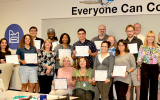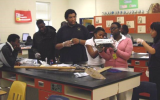Diversity

The academic success outcomes of men of color remain deficient in community colleges compared to other student groups (Valliani, 2015). While many men begin their educational journey at community colleges, most African American and Latino men do not reach degree completion (Center for Community College Student Engagement, 2014). Men of color often report that they feel unwelcome in college environments because of negative stereotypes associated with their physical appearance and challenged by academic unpreparedness and financial stress (Gardenhire-Cooks, Collado, Martin, & Castro, 2010;...
Tags:

Mesa Community College (MCC) was the first college, among six in the nation, selected by Apple to launch the iOS app development project and the first to offer associated courses for academic credit. The college views the Everyone Can Code project as more than a collection of courses. This is a foundation for a successful future for a diverse body of students.
MCC faculty embrace the concept that the key to innovation is to provide something that is unusual, to test the norms, to do it in a timely and meaningful manner, and to embrace teaching excellence through diversity and differentiated...
Tags:
It is a glaring truth. No matter how broad the scientific research or how far academia have reached to date, science, technology, engineering, and math (STEM) fields have been and remain a man’s world. Although there have been some changes in the last few decades, for the most part, women and minorities still face disparities (Office of Science and Technology Policy and Office of Personnel Management, 2016).
There are many negatives associated with women and minorities’ limited participation in STEM fields, such as repression of creativity, loss of true innovation (Del Giudice, 2014), lower...
Tags:

To address the representation gap in the sciences, a partnership of institutions implemented two different early college/dual enrollment courses for high school students as part of a larger project. One program was a concurrent (in-school) enrollment program, and the other was a summer residential program. Each program ran for five years, and all of them successfully prepared students for college STEM. Many students entered STEM programs in college, and 80 percent of them are still there today.
The Larger Project
The Minority Student Pipeline Math and Science Partnership—(MSP)2—was a joint...

A number of promising interventions have potential to benefit previously incarcerated young men of color (Wimer & Bloom, 2014). Several studies have shown that proactive programs that help young men of color connect to and progress through postsecondary education and training, as well as interventions that focus on emotional well-being and interpersonal problem-solving, lead to lower rates of recidivism, higher completion rates, and greater levels of employment (Patel & Valenzuela, 2013; Scrivener & Weiss, 2013; Heller, Pollack, Ander, & Ludwig, 2013).
Thus, in conceptualizing...
Tags:

Last September, Chandler-Gilbert Community College (CGCC) was awarded a Latino Americans: 500 Years of History grant from the National Endowment for the Humanities (NEH) and the American Library Association (ALA). As one of 203 grant recipients selected from across the country, CGCC received an award of $10,000 to produce public programming about Latino history and culture.
Beginning last fall, CGCC began hosting a variety of program activities to engage students and the community about the history and cultural impact of Latinos in the United States. Activities featured a Latino American art...
Tags:










